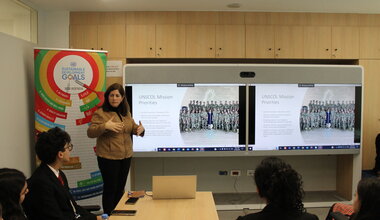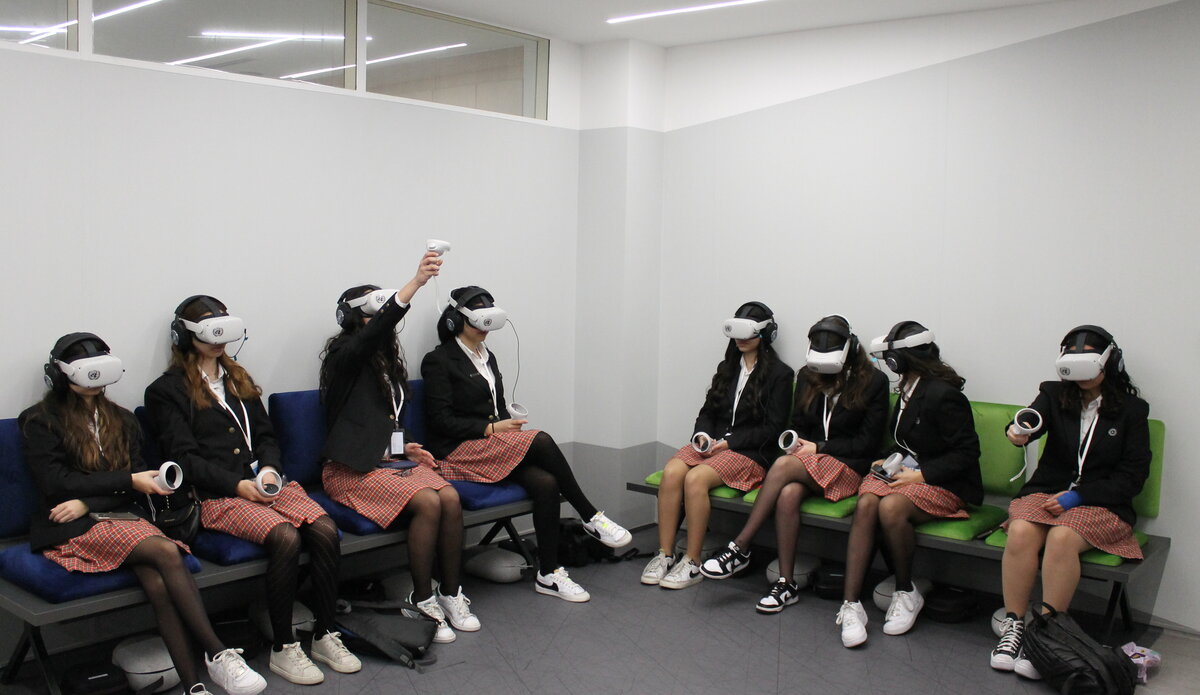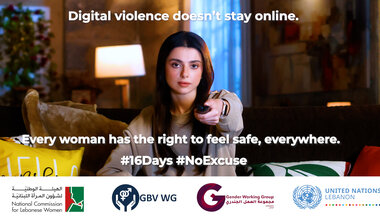Young school students engage with various UN agencies on SDGs and work of UN
On February 27, 2024, UNIC Beirut organized, at the UN-House in Beirut, briefing sessions to a group of Grade 12 students from the “React” club at Jesus and Mary school in Rabweh, northeastern Beirut to learn more about the implementation of Agenda 2030 in Lebanon, particularly SDGs 5 and 16.
The day began with the screening of “Dreaming of Lebanon,” a virtual reality (VR) documentary that offers an immersive glimpse into the aspirations of young Lebanese amidst challenging times.
Produced by the Office of the United Nations Special Coordinator for Lebanon (UNSCOL) and the Innovation Cell at the United Nations Department of Political and Peacebuilding Affairs (UNDPPA), the film used 360-degree technology to bring human-centered stories of resilience and hope to life.
“This is the first time I watch a VR. What I liked the most about it is that we have the liberty to pick and choose the questions that we want to address. I am dazzled by this new technology!” Celine Atallah said.
Students were particularly moved by the narratives of Lebanese citizens Batoul Hakim, Josephine Abou Abdo and Rafik El Hariri who were featured in the documentary.
Commenting on the story of Batoul, Michel Atallah said: “The testimony of Batoul, a Lebanese young chemist who is advocating for a greener and healthier Lebanon has inspired me. She’s like an idol, empowering students like us to change our community.”
For her part, Andrea Hanna said: “It was a very nice experience! I watched the story of Josephine, a Lebanese mom who was able to co-found a community hub and relief center named the ‘Nation Station’ kitchen, despite all the challenges she faced in the aftermath of the Beirut August 2020 port explosion.”
“The animations included in the VR reminded us of the vibrant Beirut that we used to know. The VR transported us to an imaginary world, letting us envision the Lebanon we want,” Cherly Rammouz considered.
In turn, Nathalie Saba, the president of the “React” club, commented on the story of Rafik, saying: “Rafik is a young designer from Tripoli who dreams of a safe Lebanon where he can walk without having the fear of being robbed. We share the same dream: the dream of living in a safe and secure country.”

Pascale El-Kassis, Senior Strategic Communications Officer at UNSCOL, explained to the group that UNSCOL is a political mission trying to introduce innovation into its diplomatic work, by finding new tools to get the message across and to be able to achieve its mandate.
She also held an interactive session on diplomacy and conflict prevention during which the students learned more about UNSCOL priorities, namely: conflict prevention (Resolution 1701), effective and strong state institutions, shielding Lebanon from regional conflicts, and support through a “whole of Lebanon approach”: peace and security, development, stabilization and human rights.
UNSCOL’s discussion around the VR and presentation on SDG 16 was followed by a briefing on UNIC Beirut’s work and #TakeAStep, UN Lebanon’s integrated communications campaign provided by Cynthia Darrous Khoury, UNIC Beirut’s Officer-in-Charge. A few videos from the campaign were also screened.
GBV Programme Assistant Maya Hammoud tapped on SDG 5 in general and the work of UNFPA in Lebanon in particular. She also encouraged the youths to be part of the Y-PEER Network (Empowering Young People to Empower Each Other) that aims to “empower young people to empower each other.”
In her presentation, Communications and Advocacy Officer at UN Women Lebanon Roula Rached tackled the work of the entity in Lebanon across humanitarian, developmental, peace and security spaces. She explained how women are under-represented in key peace and security institutions..
In the Q&A session, the students asked the expert how UN Women contributes to empowering women and help them claim their rights. She explained that the entity partners with a number of INGOs, NGOs, media outlets, public figures, as well as the National Commission for Lebanese Women for that purpose.
Amal Balesh, the school supervisor who was accompanying the students, provided her feedback on the visit, saying: “We really appreciate the awareness-raising sessions that the UN is organizing. They are very important and timely. Thank you for a very successful visit. The students are ecstatic.”
“It was a tremendous learning opportunity for all of us which led to new perspectives, connections, and lasting memories!” Joy Mezher said.
 UN
UN





